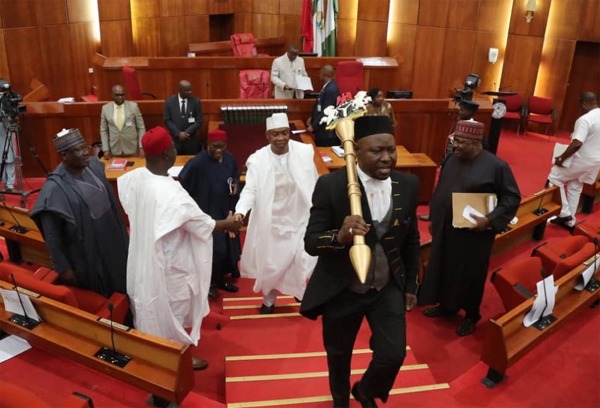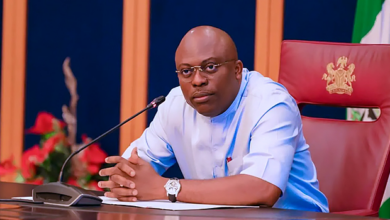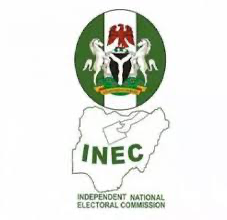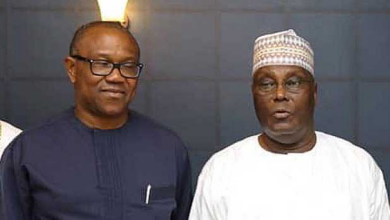Rowdy session in Senate over elections

- Senators differ on plans to probe militarization of poll
- As House moves to probe inconclusive elections by INEC
- Says development portends danger to democracy
THE alleged militarization and massive rigging of the February 23 Presidential, National Assembly and March 9 Governorship, State Houses of Assembly and Federal Capital Territory, FCT, Area Council elections, yesterday, threw the Senate into a rowdy session.
This came as the House of Representatives, yesterday, resolved to set up an adhoc committee to investigate the Independent National Electoral Committee, INEC, on the spate of inconclusive polls that had trailed this year’s general election.
The rowdy session in the Senate followed a point of order by the Chairman, Senate Committee on the Federal Capital Territory, FCT, Senator Dino Melaye, Peoples Democratic Party, PDP, Kogi West.
Melaye had requested to properly present a motion on the elections in another legislative day, but senators on the platform of the All Progressives Congress, APC, vehemently kicked against and tried to frustrate it.
Senator Melaye, who came under Order 42 of the 2015 Senate Standing Order as Amended, sought the permission of the Senate President, Dr. Bukola Saraki, and his colleagues to allow him come forward with a motion to debate what he described as the militarization of the general elections, insisting that ‘this cannot be swept under the carpet.’
In his presentation, Senator Melaye, who noted that his position was not political, said the motion would help curb electoral malpractices and correct the situation in future elections.
He said: “What I am raising this morning has nothing to do with political parties. I want to bring before this Senate the elections, both on March 9 and 23 in this country and I believe that the Senate of the Federal Republic of Nigeria shall not close its eyes to the happenings of those elections.
“I want that election to be debated on this floor. I want to bring a motion to be addressed by this Senate in the next legislative day so that the militarization of the process, the abuses of this election, will not go undiscussed in this parliament for posterity sake.
“This is my prayer. Let it be discussed as a Senate. We will debate and give accounts of what happened in our various senatorial districts with the vision of correcting electoral malpractices.”
At this point, Senate President, Dr. Bukola Saraki, who presided, put the question to a voice vote and there was loud echo of “ayes and “nays”. Saraki, who ruled that the prayer be adopted, said according to the Senate’s Standing Order, only one-fifth of the lawmakers was required to support the prayer before it could be adopted.
“Distinguished colleagues, by the order, you only need one-fifth of the senators to support the motion. It will be taken in the next legislative day,” he said.
It was at this point that trouble started as the Senate Leader, Senator Ahmad Lawan, APC, Yobe North, drew the attention of the Senate President and his colleagues to the fact that there was a non-partisan motion on the floor, but they did not hear the ruling of Saraki.
Amid the increasing noise at the hallowed chamber, Senator Lawan asked, “A non-partisan motion was on the floor. You ruled. We didn’t hear the ruling. What was your ruling?”
On his part, the deputy Senate Majority leader, Senator Bala Ibn Na’Allah, APC, Kebbi South, noted that there was no motion, adding that Senator Melaye introduced himself as a “senator-elect”.
Na’Allah said, “He was not speaking as a senator.” Disturbed by the action and trying to calm the charged senators, Saraki again explained his ruling, saying when the motion was at the end of the day brought before them, it will not be partisan as the leadership of the Upper chamber would look at it properly before it would appear on the Order Paper.
According to him, legal action will be taken where necessary. Trouble continued as Senator Barau Jibrin, APC, Kano North amid the rowdiness who stood up to question Saraki’s ruling again, quoted the order of the Senate which permits a lawmaker to challenge the opinion of the Senate president/the chairman, saying, “I don’t know your ruling on the motion.”
Saraki, however, pleaded with his colleagues not to abuse the process of the plenary and move on to other important business of the day. Since plenary session will not hold today, following the collection of Certificates of Return by the lawmakers from the Independent National Electoral Commission, INEC, Senator Melaye may not be able to present the motion, but for another legislative day.
Inconclusive polls: Reps to probe INEC
Meanwhile, the House of Representatives, yesterday, resolved to set up an adhoc committee to investigate the Independent National Electoral Committee, INEC, on the spate of inconclusive polls that had trailed this year’s general election.
The general consensus of the lawmakers in their various legislative inputs is that if electoral matters were not properly resolved now, the situation portended danger for the nation’s democracy.
This followed a motion under matters of urgent national importance promoted by Sunday Karimi Steve, (PDP, Kogi), wherein he drew attention to the critical issues of inconclusive elections in six different states of the North.
Vanguard recalls that INEC, citing different reasons ranging from cancelled votes and inability to conduct election in some local governments and polling units in Kano, Sokoto, Benue, Bauchi, Adamawa and Plateau respectively, declared governorship elections in those states inconclusive.
While leading the debate, Karimi, citing the situation in the affected states, warned of impending danger should the rescheduled supplementary elections be manipulated in favour of the ruling party. “This issue is very important to all of us. The spate of inconclusive elections in Nigeria is becoming worrisome. And we see a situation where INEC has different rules for similar situations.
“If you add all the cancelled votes in all the states in the country during the presidential election, the candidate of the APC shouldn’t have been declared winner as the number of cancelled votes should have necessitated a declaration of the election as inconclusive.
“But when it came to governorship elections, they are mostly inconclusive in states where the opposition was clearly in the lead. And why should INEC’s guideline be made to supersede the constitution?” Karimi queried.
In his contribution, Aliyu Sani Madaki (PDP, Kano), said: “What happened during the last election was that things were done without recourse to the laws. INEC acted in manners that showed bias. Where PDP was leading, they declared it inconclusive.’’
Madaki warned of dire consequences to the nation should Kano election be manipulated to favour the APC whose candidate is trailing with tens of thousands of votes. Dan Achibong (PDP, Akwa Ibom), noted that “this problem has occurred and what we should be bothered about is how do we correct it”?
“In my state, we had elections and there were similar issues, but the state resident electoral commissioner stood his ground by going through each result and comparing them with the number of registered and accredited voters in the registers and card readers and he declared the results.”
He called for a holistic amendment to the Electoral Act and the constitution to guarantee true independence of INEC.
The House Leader, Femi Gbajabiamila (APC, Lagos), reminded his colleagues of the manner their arguments missed the point about inconclusive elections.
He said while members seemed to be on the same page on the issue, the approach to solving the problem fell short of legislative intervention that it required. “I want to make it abundantly clear that everybody in this House is on the same page on this issue of inconclusive elections. However, the difference is the manner we seek for the solution.
“I have listened to the debate and a lot of us seem to misinterpret the position of the law and we do not have the powers to interpret the laws. While we agree that inconclusiveness should be something of the past, the question is how do we move forward in a manner that reduces the powers of INEC to set guidelines that encourages these kinds of situations.
The stand of the law “Inconclusive election didn’t start today. We remember the issue in Kogi State in 2015, and our colleague Faleke is here. He went all the way to the Supreme Court, which ruled that INEC was in order as it has the powers to conduct and regulate elections.
“So there is a Supreme Court ruling on this matter. The only way we can reverse the Supreme Court ruling is to amend the provisions of our constitution that allows INEC to set guidelines outside the Electoral Act and the constitution.
“But until that is done, we can’t be here and take a political approach, then we must take the legislative approach by amending the laws to limit the powers of INEC from setting guidelines that are outside the Electoral Act and the constitution. It could be one or two lines or paragraphs, but it can make the difference.”
Abdulrazak Namdas (APC, Adamawa) blamed the political class for the situation, saying though lawmakers agreed that INEC had powers to run an election, the issue of manipulation and rigging by politicians should be looked into.
He called for a change of attitudes by politicians whose desperation led to issues of inconclusive elections, adding that the clause that allows INEC to set guidelines should also be looked at.
The House, following an amendment to the prayers, resolved to set up an adhoc committee to look into the issue of inconclusive elections and report back to it.
Source: Vanguard





